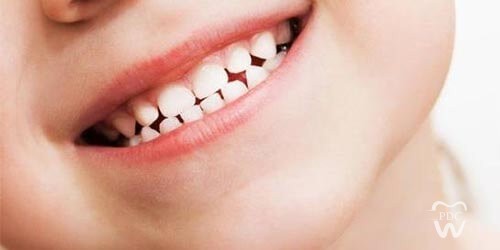“Baby teeth” or “milk teeth” are as important to infants and children as permanent teeth are to older children and adults. Normally, 20 milk teeth are found in the child’s mouth. Children have ten teeth on the upper arch and ten teeth on the lower arch of their mouth.
These “first teeth” are necessary for a child to chew and speak and also are required for the development of the dental arch as the surrounding bone forms around them. Another important point to note is that these teeth serve another very crucial role–they save space for the child’s future permanent teeth.

Speech Development-
Have you ever heard a child speak with two missing front teeth? Lack of teeth during the speech development in early ages will hamper the child from pronouncing in the right way leading to lisping and other speech defects.
Hence, just like in adults, having healthy and properly aligned teeth are instrumental to form new words and speak clearly in growing kids.
Efficient Chewing and Eating-
Milk teeth are of huge significance in the general health and wellness.
As we all very well know teeth has great importance in efficiently chewing the food. If your child has pain in his or her teeth, they may only prefer to eat foods, which cause little disturbance and thereby possibly getting rid of many healthy foods from the diet.
Growth of Muscles and Jaw Bones-
Chewing food with great variety in textures as mentioned above provides an opportunity to exercise the muscles of the jaws which in turn help in the proper development of jaw bones thereby accommodating the developing teeth.
Self Confidence-
Healthy teeth help your child feel good and boost their self-image giving them a chance to smile with confidence.
A baby tooth usually remains in the child’s mouth until a permanent tooth underneath is ready to emerge through the gums. The roots of the baby tooth dissolve and the tooth becomes loose and falls out. The permanent tooth “comes up” a few weeks later. If a child loses a tooth too early–before the permanent tooth is ready to erupt–or if it is accidentally knocked out, or is removed by the dentist because of any kind of infection/trauma to the tooth, the space must be saved. A space maintainer can therefore, be fabricated by the dentist and inserted to take the place of the “baby tooth” until the permanent tooth is ready to emerge. This helps to prevent any kind of overcrowding or mal-alignment of the permanent teeth once they erupt thus, preventing the need for future braces or “clip” treatment.
The space maintainer is a small metal device that encircles the tooth and the space to be saved. It “holds” the space until the permanent tooth is ready to erupt, stopping the other teeth from tipping or drifting into the empty space.
If the teeth on either side of the open space encroach upon the empty space, there may not be room for the permanent tooth. The new permanent tooth may erupt out of its proper position and can affect positioning of other teeth. If teeth become crowded and out of alignment with each other, then the teeth are maloccluded. Maloccluded teeth are difficult to clean, have greater chances of becoming diseased, and later might require expensive and time-consuming orthodontic treatment i.e braces or “clip” treatment.
Any damage to the milk teeth can also affect the permanent teeth present below the milk teeth within the gums and bone. Thus, it is very important to maintain oral hygiene right from the emergence of the first milk tooth in order to prevent any damage to the permanent teeth.
Do make sure to take your children for a regular dental check-up so that any decay or hole in the tooth can be detected as early as possible. This also helps the child to become more acclimatized to the environment of a dental clinic and prevents any sort of fear from developing in the child towards a dentist.
Remember- good oral hygiene maintenance starts at an early age!



